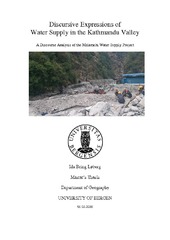| dc.description.abstract | This thesis addresses the Melamchi Water Supply Project, which is the Nepalese Government's solution to the alleged water shortage in Kathmandu. The Government's intention is to construct a water diversion tunnel between the Melamchi Valley and Kathmandu. The construction has however had repeated extensions and new completion dates. The case is approached through a discourse analysis. The thesis' purpose is to establish which discursive positions are related to the Melamchi Project and how these positions are constructed. The discursive positions are re-presented through the informants' stories. The thesis establishes that the Government still has adherence for its discursive position, but that materialization concerns have disengaged others, and that alternative discursive positions therefore have arisen. These discourses are constructed through repetitive language. There are two discursive polarizations within this universe. The first is one concerning the water volume in Kathmandu. One discursive side claims the water situation is scarce, while the other side claims that there is enough water. The second polarization is between the discourses that are produced in Kathmandu and the discourses produced in Melamchi. These discourses dispute which of the cities should have the most water, and how compensation can solve the dispute. The discursive expressions are analyzed with an emphasis on power and a coherent discourse, which are suggestions of the legitimate language that produces strong and hegemonic discourses. Bourdieu's (1991, 1995) theories are used to conceptualize the power that positions the discursive positions in the discursive universe. The thesis addresses and exemplifies how economic capital transpires into other forms of capital, which is suggested to be exercised power. Elements, moments, nodal points, signifiers and silences are used to address the coherent and potential legitimate language. I argue that the discursive position that constitutes the Melamchi Project is the strongest in the discursive universe, and I even claim that it is hegemonic. The local mobilization in the Melamchi Valley is however an eager contender. This local discourse can challenge project materialization, and the materialization concerns have demonstrated themselves important enough to be internalized in several discursive positions. The thesis is summarized in discursive timelines. One timeline explains the discursive development until now. The next timelines stipulates four alternative discursive futures. | en_US |
